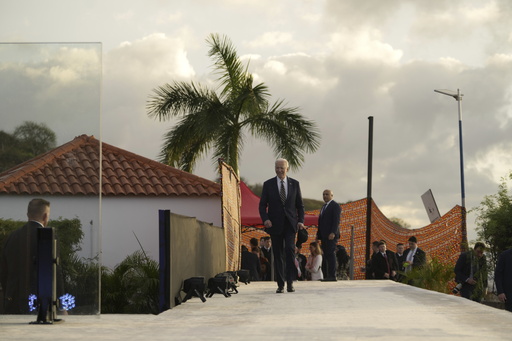
LUANDA, Angola — President Joe Biden is seizing his final days in Angola to draw attention to a significant railway project, the Lobito Corridor, which stretches over 800 miles (1,300 kilometers) across Zambia, Congo, and Angola.
This initiative, backed by the United States and its allies, is designed to upgrade rail lines in the region, which is abundant in valuable resources like cobalt and copper. These minerals are essential for the production of batteries in electric vehicles and other clean energy technologies. By the end of the decade, this railway system is poised to effectively connect the western and eastern coasts of southern Africa.
During his speech, Biden, who is known for his affinity for trains, stated, “I’m probably the most pro-rail guy in America.” His lengthy commute from Delaware to Washington while serving in the Senate earned him the nickname Amtrak Joe, making this railway project particularly meaningful to him. Biden highlighted that the Lobito Corridor represents the largest investment by the U.S. in a train system overseas.
On Wednesday, he plans to travel from Luanda to Lobito, where he will tour port facilities alongside leaders from Zambia, Congo, and Tanzania. The discussion will also involve companies looking to benefit from the corridor, including a telecommunications firm improving regional service, a food production company, and Acrow Bridge, a Pennsylvania firm set to provide nearly 200 prefabricated steel bridges to Angola.
The Biden administration believes that the Lobito Corridor will not only bolster U.S. business interests but also counteract China’s increasing influence in Africa. Biden’s enthusiasm for train travel aligns with this strategic goal of enhancing U.S. investments abroad.
In Lobito, President Biden is expected to announce an additional $600 million in investments tied to this project, which has also garnered financial support from the European Union, the G7 nations, and various African banks. Currently, transporting cargo between eastern Congo or Zambia to market takes about 45 days, predominantly relying on truck transport to South Africa. Tests conducted with the new rail system completed the journey in a much-improved timeframe of 40 to 50 hours.
Meanwhile, China has made significant investments in African mining operations and has sought to extend its economic reach through the Belt and Road Initiative. Recently, China announced a deal to refurbish another railway line connecting Zambia to Tanzania’s Dar es Salaam, a project reminiscent of infrastructure collaborations from the 1970s, but which had fallen into disrepair. Some view this Chinese renovation plan as a direct response to the Lobito Corridor initiative.
A senior official from the U.S. administration characterized the Lobito Corridor as essential for competing with China’s influence, emphasizing a business-driven strategy rather than a purely political competition. The aim is to elevate U.S. standing by facilitating long-term investments that can benefit communities throughout the region. The Lobito Corridor is considered a model that the U.S. hopes to replicate in other global areas.
Although the corridor will not be finished for several years, its ongoing development will likely carry over into the administration of the incoming president, Republican Donald Trump. Despite potential political changes, the Biden administration highlights that past Republican initiatives have shown bipartisan support for investing in African business opportunities.
